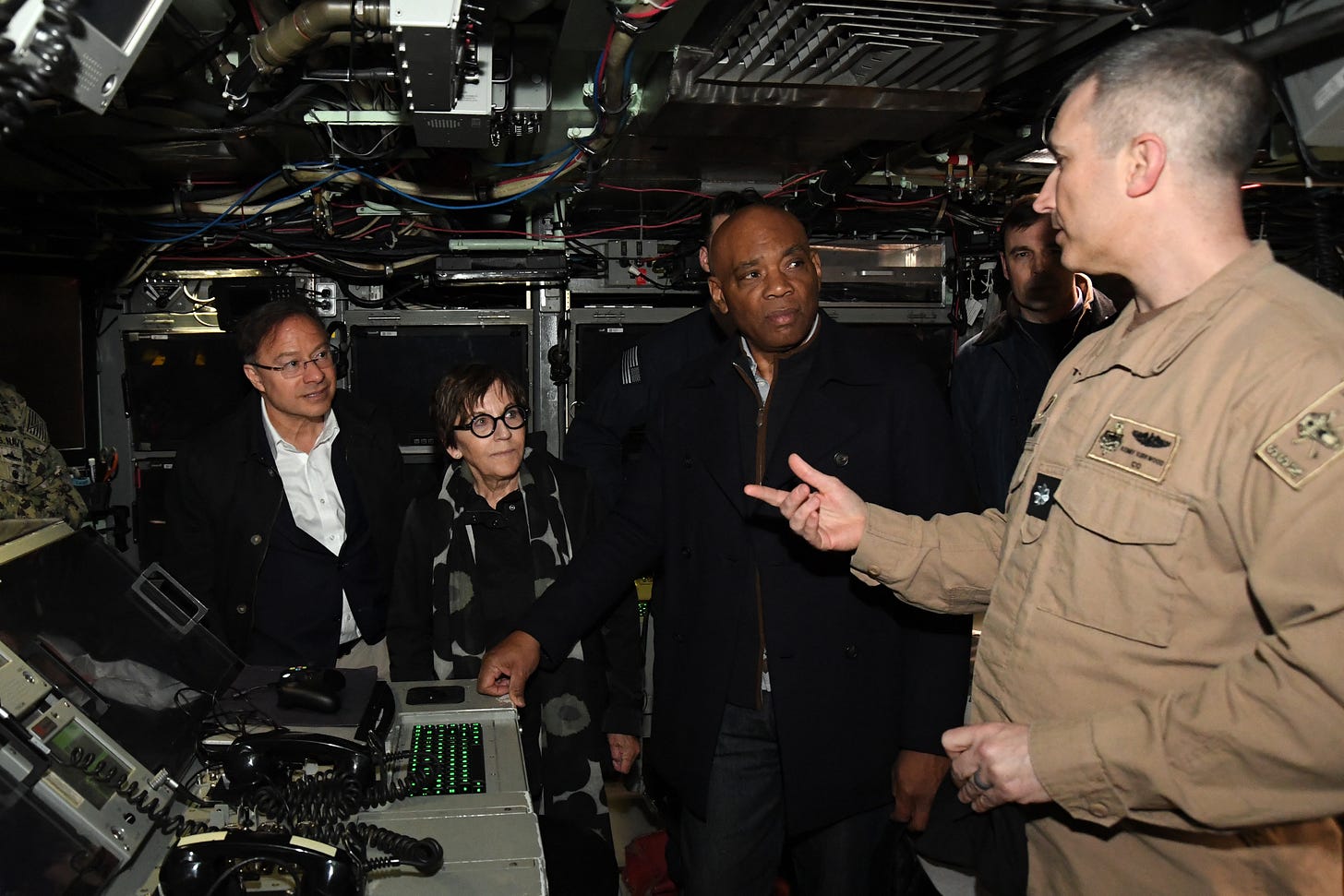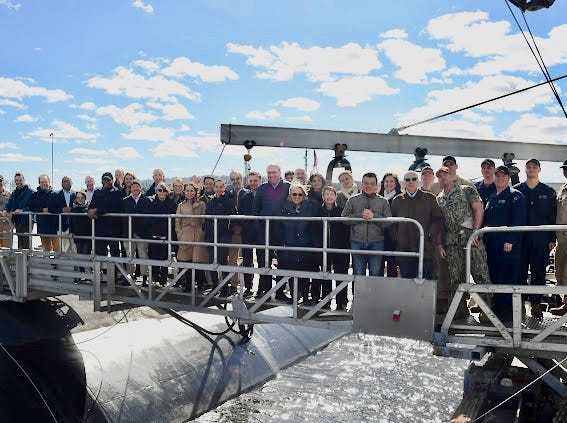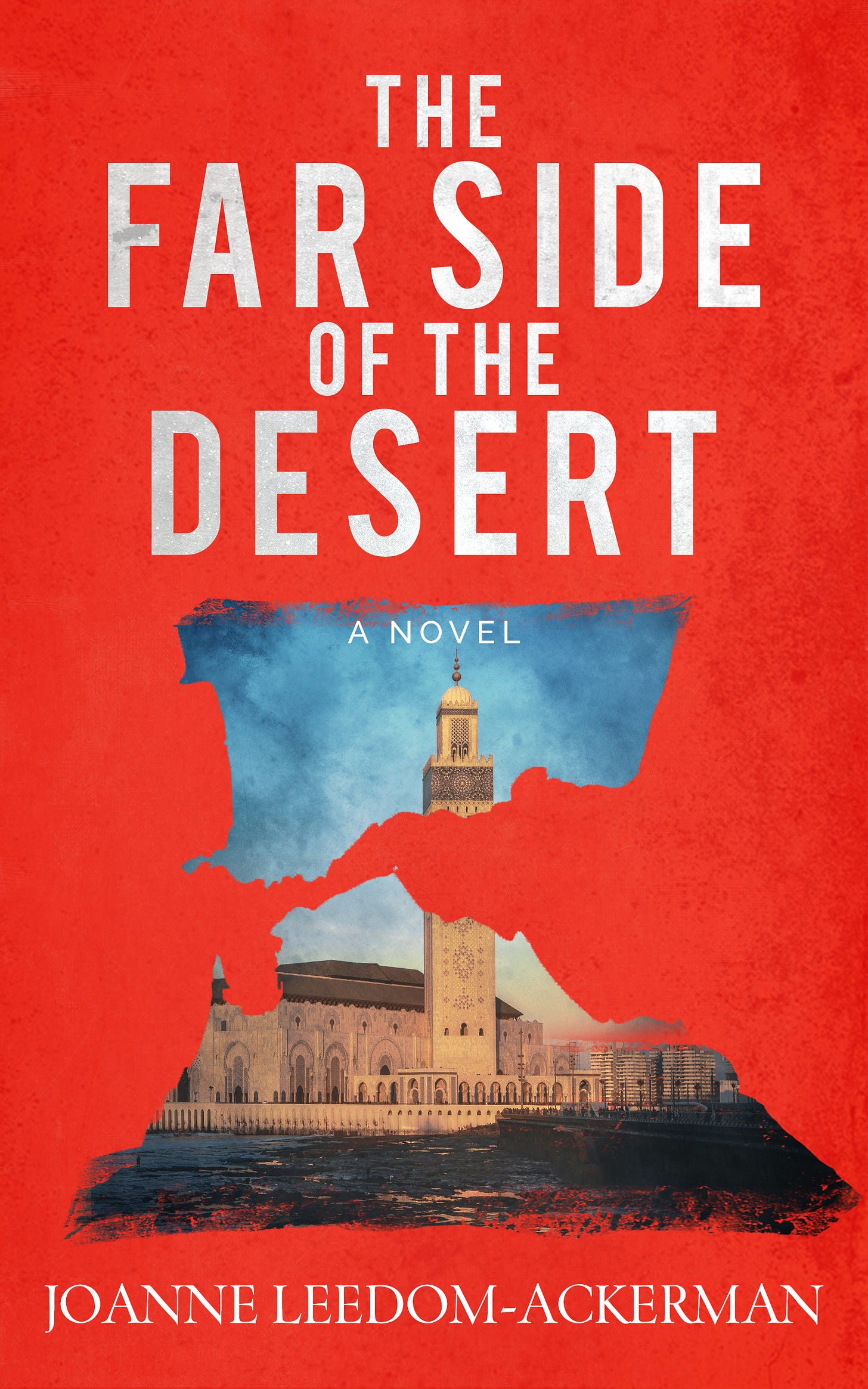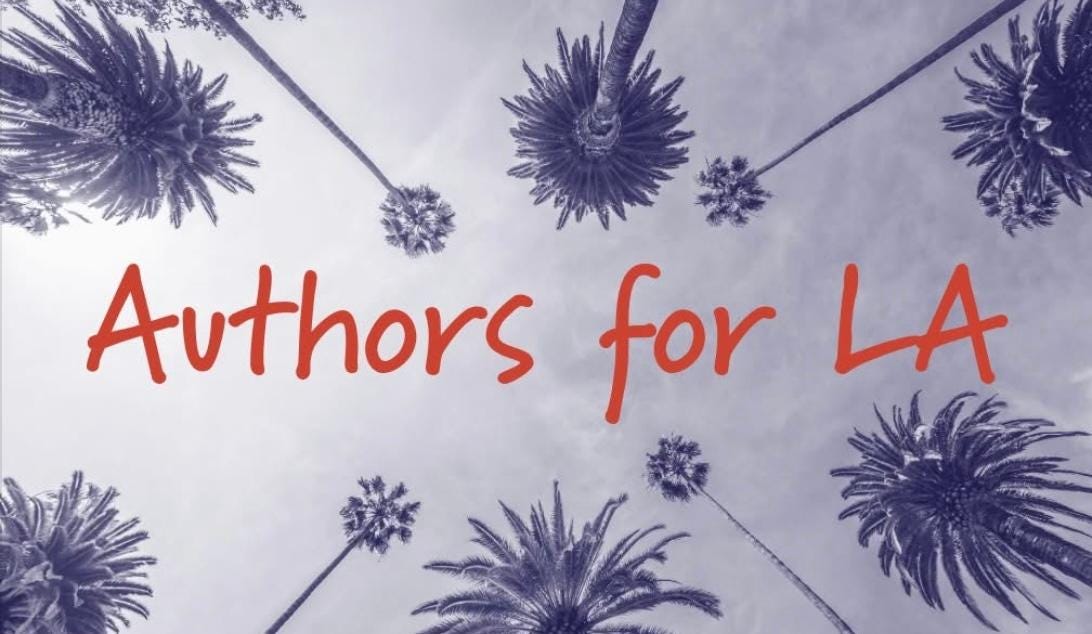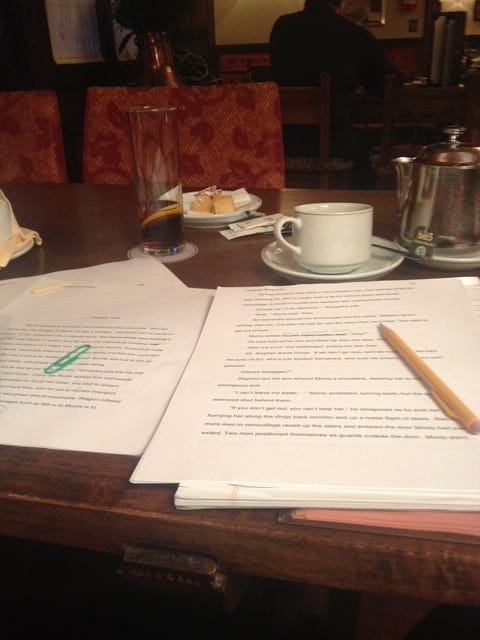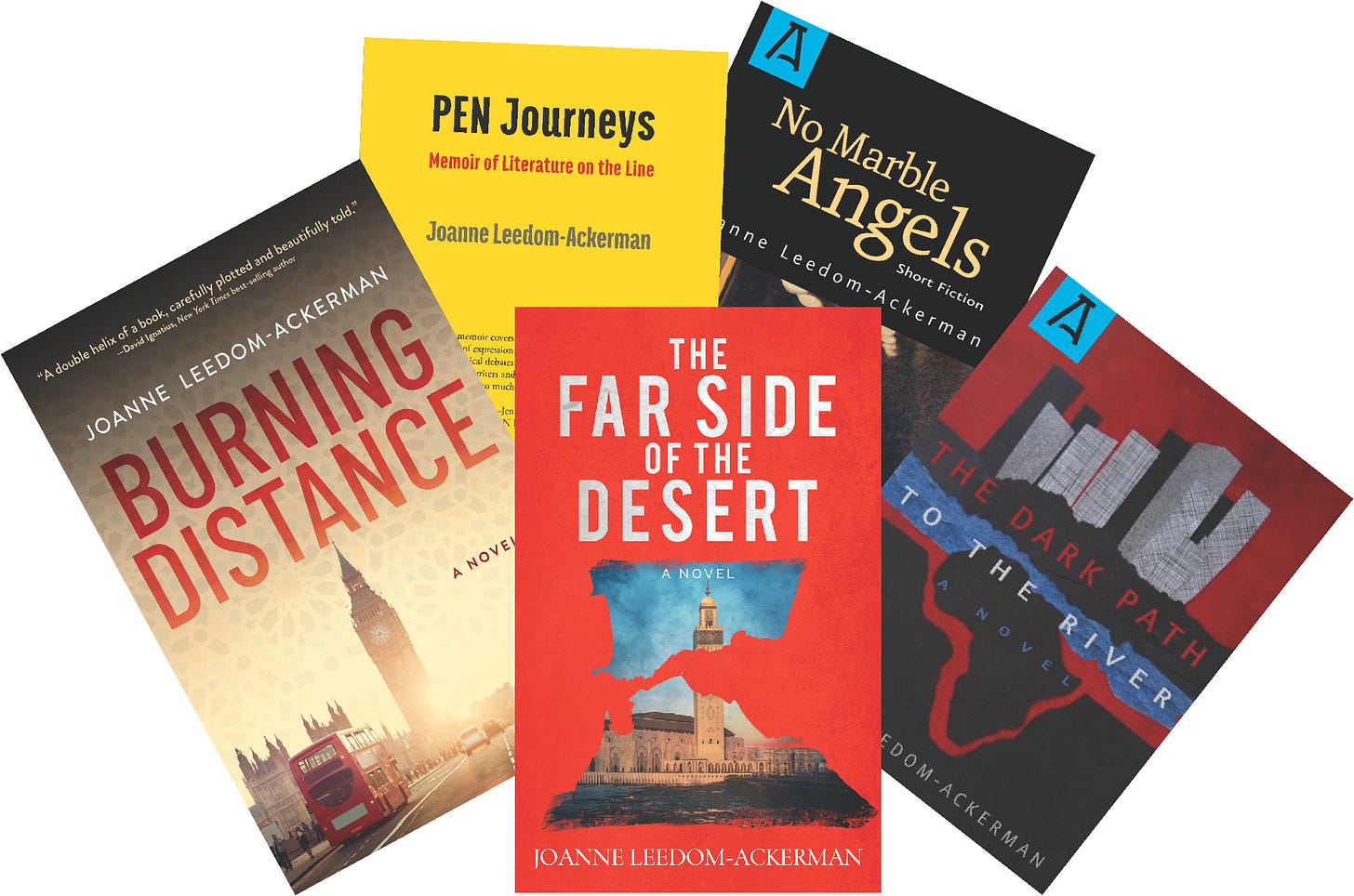Competing Voices: Warbling in the Dark, Singing in the Morning, Searching for a Symphony
Dear Friends,
Welcome to April’s Substack.
I hope you’ll enjoy this month’s blog Competing Voices: Warbling in the Dark, Singing in the Morning, Searching for a Symphony.
The audio version is available by clicking the link in the blog itself or clicking the link here for all podcasts. https://joanneleedomackerman.substack.com/podcast
Book News announces the paperback publication of The Far Side of the Desert April 15, some new podcasts and other news. I’ll be at the Annapolis Book Fair May 3 and in Dallas May 22.
The Writers at Risk section focuses on the case of poet Amanda Echanis of the Philippines.
The Books to Check Out section celebrates Lawrence Wright’s brilliant new novel The Human Scale about the conflict between Israel and Palestinians, particularly in Hebron and 53 Days by Timothy W. Ryback about the first 53 days after Adolph Hitler was appointed the 15th chancellor of Germany in which he “destroyed the constitutional republic through constitutional means.”
In the Scene section you’ll find a photo, along with text from The Far Side of the Desert, and in Words of the Month a couple of useful words to know.
I look forward to meeting new and current readers. Even if you’ve read the hardcover of The Far Side of the Desert, I hope you’ll share the paperback with friends. Thank you to everyone who’s come to bookstores, libraries, book clubs and online for both my latest novels Burning Distance and The Far Side of the Desert.
If you’re interested in having me speak at a venue or with a book club, you can click here. Thank you too for reading and sharing this free monthly Substack On the Yellow Brick Road. I hope you’ll stay in touch!
Competing Voices: Warbling in the Dark, Singing in the Morning, Searching for a Symphony
Carolina Wren, Canadian Goose, White-throated Sparrow…birdsong at dawn on a Sunday morning.
The light has shifted and arrives later now that daylight savings is over. More bird sounds rise as the weather warms. The birds appear to harmonize and get along with each other with their different pitches and warbles and squawks. Most sing from high in the trees, out of sight, occasionally flying overhead. The geese and ducks glide silently on the water but talk to each other from the air.
I sit in the gathering light and listen to the birds chirping and trilling on this chilly March morning. The sun is about to break over the trees on the horizon. Here it comes…a full golden orb ascending…coming quickly now so that I can’t write about it and take a photo at the same time before it is fully above the horizon.
My dog sits beside me and is also listening to the birds and watching the sun rise. I wonder what she sees. I’m told dogs only see in black and white…what they miss of the resplendent golds and greens and blues. But she hears sounds I don’t hear. Before I hear or see the squirrel approaching the bird feeder, she races off, and (thankfully) never catches the squirrel who defies her with its own special power of scrambling up trees. I don’t think my dog is predatory so much as territorial and just wants to play and to chase.
The animal and aviary kingdoms have much to teach us, perhaps more than ever these days. I hesitate to romanticize, but of course that is what I’m doing. I’m sure there are hierarchies among the animals and even among the birds, but they appear to get along better and to abide with their differences, not to cancel out those they don’t agree with.
Back among the human species and body politic, I recently visited, along with other members of the Council on Foreign Relations, the “Submarine Capital of the World” in Groton, CT where submarines are built and docked. In touring inside one of the submarines, we saw and tried to imagine how 130 men (and some women) existed together for eight months in spaces not much larger than the size of a coffin, moving along corridors barely as wide as a person, with missiles and torpedoes at bedside and cables and electronic equipment running throughout. It clearly takes accomplished sailors and those who know how to live and work in extremely close quarters. It also takes leadership that encourages and helps foster the bonds of community. An understood and shared mission helps, but it must be more than that. It must be a commitment to respect each other and operate as a community in spite of differences. I’ll resist romanticizing these submariners, but those we talked to were committed to their vocation and to getting along with each other.
These days there is a need for such lessons among our citizenry and our leadership, and if leadership at the top doesn’t have that goal, then person by person, day by day, action by action, citizens I hope will.
[Along the same theme I hope you’ll find of interest two articles, one about the White Helmets helping in Syria in the March 25, 2025 Christian Science Monitor and the other “The Politics of Love in Turkey’s Protests” in the March 26 Christian Science Monitor.]
The paperback of The Far Side of the Desert publishes April 15 from Oceanview Publishing. I hope you’ll order, read and enjoy. If you’ve read the hardcover and enjoyed, I hope you’ll buy the paperback and give it to friends!
I also hope you’ll tune in to my upcoming radio and podcast interviews. And I’ll be at the Annapolis Book Festival May 3 on a panel about international fiction and in Dallas at Interabang Books May 22 interviewing a new author (schedule below).
“The Far Side of the Desert by Joanne Leedom-Ackerman is a razor-sharp tale of sisters, daughters, spies, and lovers; some relatable, some who appear to be beyond redemption, and some whose acts of good or evil are much harder to tease apart. Deftly managing the tightrope between the tightly-paced geopolitical and the nuanced psychological, Leedom-Ackerman delivers a thriller that transcends genre and has stayed with me long after I read it in one breathless sitting. The Far Side of the Desert is one of my top reads this year!”
—Deborah Goodrich Royce, nationally bestselling and award-winning author of Reef Road, Ruby Falls, and Finding Mrs. Ford
Upcoming Interviews and Podcasts:
Tuesday, April 1
The Diane Jones Show, KLPW Radio, Washington, MO
9:40- 10:00 AM ET (LIVE)Monday, April 14
-Morning Edition, WOJB 88.9 FM, NPR, Hayward, WI
9:20 - 9:50 AM ET (LIVE)-Cyrus Webb Presents
10:00 - 10:30 AM ET (LIVE)-The Jim Engster Show, Louisiana Radio Network
10:45 - 11:00 AM ET (LIVE)Tuesday, April 15
WGVU Radio, NPR affiliate in Grand Rapids, MI
(taped-link will be provided when published)Wednesday, April 16
KMA Radio, KMALand, ABC Radio/ Westwood One Affiliate
9:20 - 9:30 AM ET (TAPED)Monday, April 21
The Frankie Boyer Lifestyle Show, National
10:00 -10:30 AM ET (LIVE)Friday, April 25
The Round Table, WAMC Productions/ NPR - Albany, NY
(taped-link will be provided when published)Thursday, May 1
KKNW AM1150 & FM 98.9HD3, Seattle
1:00- 1:30 PM ET (TAPED)Saturday, May 3, 11:00 AM ET
Annapolis Book Festival
Author Panel: “The International Writer”
Science & Library Center (101-102)
534 Hillsmere Drive
Annapolis, MD 21403Thursday, May 22
-Writers' Voices, Podcast
(taped-link will be provided when published)-Interabang Books, Dallas, in conversation with Maya Blue
6:00pm-7:00pm
Burning Distance (Oceanview Publishing, 2023 and paperback in 2024) was honored by the 2024 American Book Fest International Book Awards as a Finalist in the Best Mystery/Suspense and Thriller/Adventure categories.
“Running the gamut of emotions from fear to love, this plot surges along as unpredictable as a riptide. Romance and thriller readers will both find plenty of mischief and mayhem."
—Steve Berry, New York Times best-selling author of The Omega Factor and The Warsaw Protocol
I was glad to be part of the Authors for LA Auction which has raised funds for the Red Cross in support of writers and others in the Los Angeles fires. Funds are still needed and a list of where you can donated is at the end of the blog in my February 2025 Substack.
Thank you to all who have come together and shared readings and conversations around my novels in 2024.
Selected recordings of past events and interviews:
Interview with Janeane Bernstein on NPR’s KUCI, Get the Funk Out!
Book Launch for Akram Aylisli's People and Trees with Plamen Press
Why Baldwin Matters Series, The Alan Cheuse International Writers Center
Malaprop’s Bookstore and Café in Asheville, NC
Kinokuniya Bookstore in New York City with Salil Tripathi
Baum on Books on WSHU Public Radio
Interview with Anna Roins of Authorlink
Interview with Deborah Kalb
For more podcasts, videos and interviews, click here
Amanda Echanis (Phillipines)
(Sources include PEN International, Rappler, Human Rights News, Literary Review)
PEN International has called for an investigation into the continued detention of ‘red-tagged’ Philippine writer and activist Amanda Echanis, who remains in custody after being arrested December 2020 at her home with her one-month old baby.
Echanis was reportedly arrested during the service of search warrants in Barangay Carupian, Baggao, Cagayan at dawn by elements of the Philippine National Police, Criminal Investigation and Detection Group, and the Armed Forces of the Philippines. She is presently detained at Camp Marcelo Adduro in Tuguegarao City, Cagayan.
Daughter of assassinated peace activist Randal “Ka Randy” Echanis, Amanda was charged with illegal possession of firearms, a charge she denies as one used against those who’ve been accused of links to communists. Echanis insists evidence was planted.
Detained now for over four years, with court hearings repeatedly postponed and no bail, Echanis argues that her right to a fair trial without undue delay has been violated.
In 1990 her father, an activist supporting rights of rural workers, was arrested on the same charges which were ultimately dismissed in 1992. At the time Amanda stayed at the detention center with her parents when she was less than two-years-old and became the country’s youngest “political prisoner.” Just months before her arrest, her father was brutally murdered in a case that remains unsolved.
Echanis continues to write in detention and has published a collection of poetry and essays entitled Binhi ng Paglaya (Seeds of Liberation) which has won the 2023 Southeast Asian Translation Mentorship award that will support its translation.
She published her first book in 2006 entitled Tatlong Paslit na Alaala (Three Childhood Memories), a collection of stage plays about the struggles faced by children from different socio-political contexts and has published a screenplay titled, Nanay Mamen, which depicts the life of celebrated anti-poverty activist, Carmen ‘Nanay Mamen’ Deunida.
“The ongoing detention of writer and activist Amanda Echanis is a damning indictment of the Philippines’ justice system,” said Ma Thida, Chair of PEN International’s Writers in Prison Committee. “We urge the Philippine authorities to immediately conduct an independent and transparent investigation into the circumstances of her arrest, including allegations of evidence planting.”
To Take Action for Amanda Echanis:
Send Messages of solidarity to Amanda Echanis noting:
That you are sending a message of goodwill in the hope that your card finds her in good health/spirits;
Give a return address should she be able to reply.
Send appeals to the Philippine Embassy in your own country. Embassy addresses may be found here: https://www.embassy-worldwide.com/country/philippines/
calling on them to ensure Amanda Echanis’ right to a fair trial and ability to establish her innocence without further delay.
calling for an impartial and effective investigation into the circumstances of her arrest, including allegations that evidence used against her was fabricated.
urging the Philippine authorities to follow the Philippine Supreme Court’s ruling and immediately end the practice of ‘red-tagging’, which has had a deadly toll on writers, journalists and activists engaged in peaceful expression.
On Social Media
Spread the word about Amanda Echanis’s case. Use the hashtags #FreeAmanda Echanis, #IWD25 and #InternationalWomenDay, tagging @peninternational (Instagram), facebook.com/peninternational (Facebook) and @peninternational.bsky.social (Bluesky).
An attack on a writer, the shutting down of a publishing house, the torching of a newspaper reduce the space in the world where ideas can flow. Freedom of expression is vital to writers and to readers but is challenged daily around the world. Listed here are organizations whose work on human rights and in particular issues of freedom of expression I’ve been engaged with directly and indirectly over the years. Some of the organizations have broader agendas, but all have contributed to keeping space open for the individual voice.
PEN International (with its 147 centers in over 100 countries)
PEN American Center
English PEN
PEN/Faulkner Foundation
Human Rights Watch
Amnesty International
Amnesty International USA
International Freedom of Expression Exchange (IFEX)
Committee to Protect Journalists (CPJ)
Article 19
Index on Censorship
Poets and Writers
Authors Guild
International Center for Journalists
Each month I consider which books to feature and pair together in this section. Though I usually read two or more books a month, I don’t necessarily feature those. I am always pleasantly surprised when the pairing comes together, whether it is international political thrillers as in this February’s Substack, or two dynamic nonfiction books by friends last month or short story collections, one new and one a decade old with similar themes and structure though from “opposing” historical points of view in last May’s Substack.
This month I knew early I wanted to profile Lawrence Wright’s new novel The Human Scale. I have long admired this fellow Texan, though mostly for his nonfiction books, including The Looming Tower. We grew up in Dallas at the same time though in different schools and didn’t know each other. My son Elliot reviewed The Human Scale for The New York Times Book Review and interviewed Wright at the 92nd Street Y in NYC which led me to buy and start reading the book on publication. Without these serendipities, I might not have focused so quickly. I highly recommend this brilliant novel which takes the reader into the heart of the Israeli and Palestinian struggle and the ultimate October 7 massacre through complex and heart-felt characters.
I wasn’t sure what I would pair with it, and then, in the mail came a very small, modest paperback reprint from the monthly subscription my daughter-in-law gives me to Thornwillow Press. Thornwillow reprints classics and remarkable writing. This month’s offering was 53 Days by historian Timothy W. Ryback, originally published in the January 2025 Atlantic. This long essay narrates the story of the 53 days in which Adolph Hitler, the newly appointed 15th chancellor of the Weimar Republic, transformed Germany’s democracy to bend to his will, using its own constitutional processes. The narrative is chilling and feels hauntingly relevant.
One book is a novel and the other non-fiction. Both take on history, current events and the fragility of human systems and the human heart.
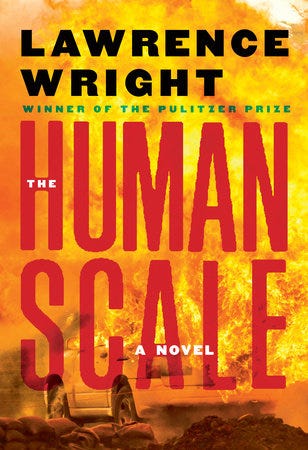
Lawrence Wright, who won the Pulitzer Prize for his brilliant nonfiction book The Looming Tower about the events leading up to 9/11, brings the same intelligence and skill to his recently published novel The Human Scale. It too will likely garner recognition during awards season for his passionate characters and masterful weaving of history and heart in the enduring struggle between Israelis and Palestinians, a struggle that culminated in the October 7 massacres.
In The Human Scale American Palestinian FBI agent Anthony Malik and Israeli detective Yossi Ben-Gal team up to solve the murder of the Israeli police chief in Gaza only to discover that nothing is as it appears. The Human Scale unfurls the conflicts and the multiple points of views of characters whose life experiences and histories have shadowed each other and resulted in a kind of mirror image that shatters upon encounter with the other. The reader is left with understanding and sympathy for these different life experiences and points of view, none more tragic than the noble souls who believe there can be peace among the corrupt scenarios in the region.
The reader cares about the possible love stories within the larger narrative and the individual mysteries that underlie the larger mystery of history. The locale is the West Bank, Gaza and Israel, particularly Hebron, with characters moving around this beloved yet forsaken landscape.
If one is looking for a compelling read that will leave you wiser, educated but also perhaps despairing, The Human Scale is well worth the plunge into its 448 pages.
From The Human Scale:
The bomb that didn’t go off was aboard a United Airlines flight from Jordan’s Queen Alia International Airport bound for JFK. It was another sweltering day in the hottest year on record, and the temperature inside the plane was insufferable. The pilot promised the restive passengers that the air-conditioning would kick in after takeoff, but a sandstorm suddenly swept out of the desert, pounding the windows like a desiccated hurricane and leaving the aircraft stranded at the end of the runway. The plane heaved. Passengers swooned. Eventually maintenance called the plane back to the gate and United scrambled to ready another aircraft, which would have to come from Cairo when the storm passed. Some of the passengers bailed out but most hung around the terminal, drinking cocktails in the bar, watching the sun surrender to a dust-choked sky.
It wasn’t until the luggage was transferred to the new aircraft that a detection dog froze in front of a metal suitcase. Instead of barking or nosing the offending article, which would alert his handler to drugs, the dog sat and stared, as he had been trained to do in case of explosives. Any slight movement could set off the bomb. Within minutes, the airport was evacuated—because of a gas leak, passengers were told—so they stood in the parking lot shielding their faces against the stinging sand and cursing their luck. Nobody knew that they might all be dead now, their bodies shredded by the blast and scattered across the Mediterranean somewhere near the boot of Italy.
The bomb squad arrived an hour later with a portable X-ray machine, which revealed the commonality of modern improvised explosives: batteries and copper wiring, and what could be an altimeter, designed to trigger the bomb when the plane reached a specified altitude. The device was implanted in what looked, in the ghostly thermal image, like a stuffed animal.
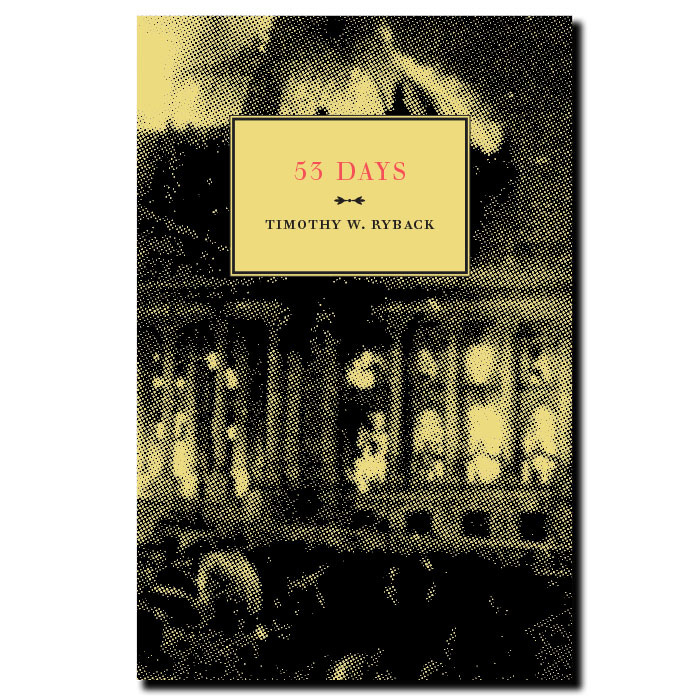
Historian Timothy W. Ryback’s 53 Days was originally published in the Atlantic magazine and recently re-published as a paperback by Thornwillow Press. It lays out the methodical path of Adolph Hitler after his appointment as the 15th Chancellor of the Weimar Republic to dismantle Germany’s constitutional democracy. Using constitutional means which he had studied over the prior decade, Hitler and others destroyed the republic and its democracy in just 53 days and transformed it into the ignominious Third Reich with Hitler as its unquestioned leader.
A noted historian of European history and politics and director for Historical Justice and Reconciliation in The Hague, Dr. Ryback has authored numerous books on the period, including Takeover: Hitler’s Final Rise to Power and is a former lecturer at Harvard University. His narration of Hitler’s plan and execution using constitutional democracy to destroy democracy is chilling and should give any reader who has watched that process at home or abroad reason for heightened concern and action.
Dr. Rybeck writes, “Invoking Article 1 of the Weimar constitution, which stated that the government was an expression of the will of the people, Hitler informed the court that once he had achieved power through legal means, he intended to mold the government as he saw fit.”
From 53 Days:
In one of the most astonishing political transformations in the history of democracy, Hitler set about destroying a constitutional republic through constitutional means. What follows is a step-by-step account of how Hitler disabled and then dismantled his country’s democratic structures and processes in less than two months’ time….
Hitler opened the meeting by boasting that millions of Germans had welcomed his chancellorship with “jubilation” then outlined his plan for purging key government positions then filling them with loyalists. At this point he turned to his main agenda item: the empowering law that, he argued, would give him the time (four years, according to the stipulations laid out in the draft of the law) and the authority necessary to make good on his campaign promises to revive the economy, reduce unemployment, increase military spending, withdraw from international treaty obligations, purge the country of foreigners he claimed were “poisoning the blood of the nation,” and exact revenge on political opponents. “Heads will roll in the sand,” Hitler had vowed at one rally.
Sharing here image and passage of text from The Far Side of the Desert:
The news stories about Monte’s disappearance proliferated around the globe:
U.S. Diplomat Missing
Kidnapped? Dead?
Where Is Anne Montgomery Waters?
Samantha and Cal worried that the publicity was counterproductive, especially the comparisons to Cal’s friend, Allen Roy, a journalist who’d been kidnapped and executed two years before. The video of his beheading had been released to maximum impact after the frenzied publicity following his disappearance.
Samantha and Cal didn’t share their anxiety with their parents, who didn’t share theirs. Everyone was trying to be brave, but Samantha feared that the very power their family was connected to put Monte at risk.
(Over the years I’ve accumulated a running list of words I haven’t known from two main sources: WordDaily and WordGenius)
Tertiary
/ˈtərSHēˌerē/
Part of speech: adjective
of the third order, rank, stage, formation, etc.; third.
(Geology)noting or pertaining to the period forming the earlier part of the Cenozoic Era, occurring from 65 million to 2 million years ago, characterized by the development and proliferation of mammals.
Examples
"Everywhere you look, there's branding and advertising. It has the secondary or tertiary effect of causing people to then want to act out and propagandize themselves." L.A.'s gone all in on hyper-specific bumper stickers — the weirder the better | Renée Reizman
“The cast in the current touring iteration gives off a somewhat tertiary impression. 'Wicked,' back at the Pantages Theatre, is as popular as ever. But is it a good musical?” | Charles McNulty
“The schools are also concerned pupils with special needs may be unable to finish qualifications and access tertiary education.”
Devoir
/dəˈvwär/
Part of speech: noun
an act of civility or respect.
respects or compliments.
something for which a person is responsible; duty.
Examples
"’Now, Papa,’ said the Girl, ‘just go right along and do your devoirs in there—and I'll stay and talk to him—' The father went obediently.” The Literary Sense | Nesbit, E. (Edith)
“Patient confidentiality has long been an integral part of a physician's professional devoir.”
I’ve spoken at bookstores, university classes, book luncheons and in-person and zoom book clubs and look forward to more ahead. I enjoy giving readings and addressing audiences in many venues and moderating discussions on a wide range of topics and most of all meeting readers.
Click here for a list of future and past public events.
Or fill out the speaking request form to schedule an event.
I like engaging with readers so if you are in a Reading Group or Book Club and read one of my books, I’m glad to be in touch by email, zoom, or when possible in person. I can also suggest discussion topics.
Fill out the reading group form here to schedule a meeting.








